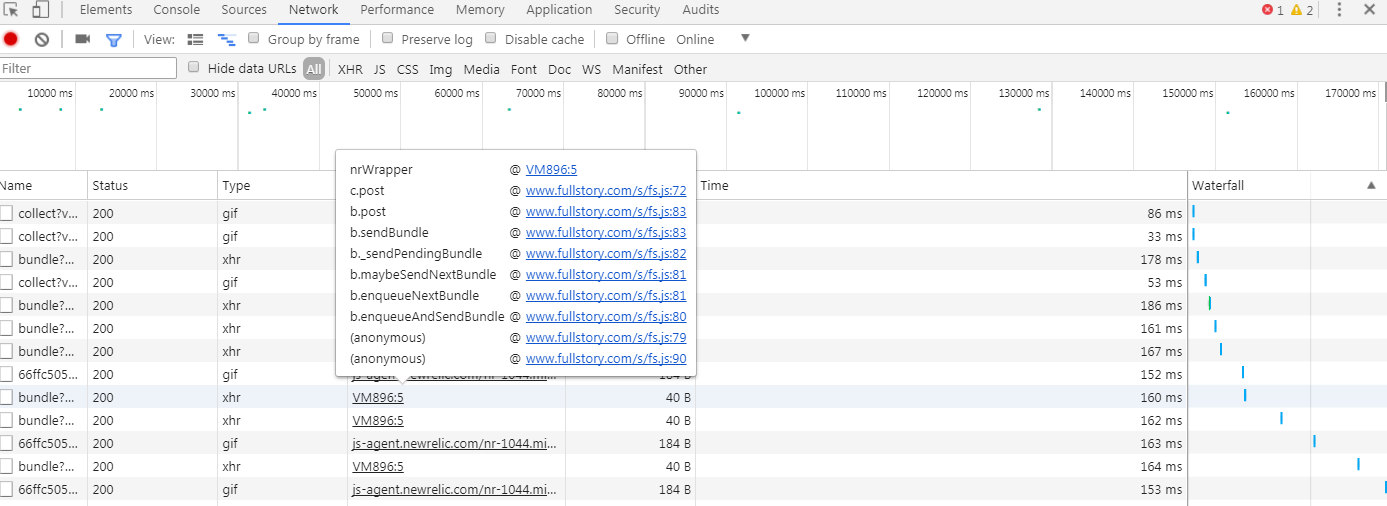Seems to send a small packet every few seconds.

Seems to send a small packet every few seconds.

Interesting…
Upon first opening Chrome (which I have default to the GFUI site) I see that the fullstory script is blocked by uBlock Origin, but upon reloading the page after that it doesn’t even try to load the fullstory script. This explains why I wasn’t seeing it at all when I’d watch the network, since I had to reload after initial load to see the traffic.
Page reload also points out that an upcoming Chrome version is going to start distrusting the SSL cert GF is using ![]()
Initial load with opening of Chrome:
Reload of page:
Yep. Anyone with a Symantec SSL Cert is seriously screwed.
@Rita and @dan any timetable to migrate away from the Symantec SSL?
This is only news if you don’t work in a tech field. hahah. Yes we monitor everything, what do you think “big data” is?
What I don’t get is why you need to send user input to a third party site. Why not simply send it to your own server and analyse it in house? That reduces the security risks.
Many years ago I wrote a large GUI app, a UML CASE tool that generated complete applications. I logged user metrics in the same database that stored the models and analysed them myself. Why would I pay a third party to harvest data I easily have access to myself?
GF is not using it’s own servers for any of this or that.
No but it has servers under it own control that is different from servers under somebody else’s control even if they are all owned by Google or Amazon.
Doing usage analytics is hard to do well, so almost every web site uses a third-party app to collect and analyze the data. Google Analytics, Adobe Analytics, and dozens of competitors each with strengths (such as capturing usage of ‘single page apps’), are almost universally used. They all have very clear privacy policies around the data, who can access it, etc. I used to do lots of web log analytics (for tens of thousands of sites, and these days it’s just not worth it - there are fantastic services that are much easier to use. Google Analytics is very widely used, for example, because it’s very good and free - Google gives it away to help steer sites towards using Google’s ad services.
Typically sites configure them not to capture sensitive info such as passwords, credit card numbers, etc., because that kind of sensitive data adds complexity to manage and won’t help you improve your user experience. information"
I would imagine that the GF team would also prefer to focus development on core capabilities; not building analytics systems.
I would imagine that the GF team would also prefer to focus development on core capabilities; not building analytics systems.
I certainly hope so.
Not big enough for complete vertical integration maybe. And even then contracting specialized services can create better efficiency, at least in theory. People are free to come up with solutions that work with their business plan. Again I assume we are dealing with rational actors here who are smart enough to have asked these questions and come up with compelling reasons why they are doing what they do. Corporations will be corporations and as such it will be opaque to those outside.
Yes but why not buy a script that sends the data to your own sever and buy a tool to analyse it. Why do these companies want the data sent to them?
Why do these companies want the data sent to them?
Different answers for different web analytics providers. As the saying goes, if the product is free, then YOU are what’s being sold.
For most of them (Adobe, FullStory, many, many others), they provide a paid service to their customers, and the customers own the data. They need the data sent to them to be able to provide the service customers are paying for. For Google, they give the web analytics away for free, because it works well with Google’s ad services, so the free analytics helps drive sites to their (immensely profitable) ad businesses.
All of the companies that do more than simple analytics operate as Software as a Service (i.e. they run it, you hook in with web services) because it’s much cheaper and easier to operate a service than to ship software to people to run. It’s become the dominant model for most complex software systems, because customers would rather plug into a dozen vendors’ SaaS systems than install and manage a dozen licensed applications.
Good info